 |
A Sensible Approach
to Sensible Investing?
|

|
|
How about a sensible approach to sensible investing?
|
If you like this
material,
then tell your friends about it -->
|
|
|
Why consider this
approach?
The Australian Share Market enjoyed a great bull
run from 2003 until late 2007 when the market
topped out.
It then fell significantly resulting in a
loss of funds for many people.
Unfortunately for some people this was a severe
loss of funds, and in come cases it has postponed
retirement.
Some people lost money on their own share
investments, or managed funds. Some people lost
money from their superannuation fund through no
fault of their own. They were trusting their
financial advisor, or their superannuation fund
manager, or whomever, to look after their funds.
(Perhaps it is time to redefine Contrarian Investing?)
This Global Financial Crisis (GFC, or Global
Credit Crunch) might have been unforeseen for many
people, but it was apparent in the sharemarket
price charts - for those who know at least a
little about how to read them. These people either
lost very little, or actually made money during
this time.
Remember
that the price charts summarise the
underlying opinions and emotions of the market
participants.
Every chart tells
a story, and it pays to understand the stories
in the price charts.
(This is Technical
Analysis)
Jump ahead to the COVID
times of 2020 and onward, and for the next couple
of years the entire global community and the
equity markets were struggling to recover back to
pre-COVID times. Making money in the markets was
not easy during this time, but knowing how to read
the stories in the price charts took away a lot of
guesswork, and removed much of the risk.
In hindsight, many people can now see that
perhaps we need to change the way
we have traditionally looked at investing.
So, how about a Sensible
Approach
to Sensible Investing?
How can we describe "sensible
investing"?
|
Consider the following:
Fact#1:
The
Sharemarket can fall between 20% and
50% every few years,
and it can take 3 to 5 years or more
before it recovers the lost ground.
Not convinced? See the bear
markets
history.
Fact#2
- A definition for the term "blue
chip":
"Larger
companies with a long history of
profitability and stability."
(Source:
www.asx.com.au,
June 2011 to 2016+)
"Larger
companies
that are known for their ability to
make profits
in good times or in bad, and with
reduced risk of default."
(Source: www.asx.com.au, circa 2008,
pre-GFC)
BUT, this does not
guarantee that their share price will
rise forever.
Some blue
chip stocks are heavily
impacted in every bear market,
especially during the recent GFC.
In fact, blue chip
shares can be disappointing (read more...).
|
So
you are investing,
or you want to invest,
in the sharemarket?
Here is some advice:

Are you
Share Market Ready?
|
|
True or False?
"We should leave our share investments
in the market, even in Blue Chips,
because we are in it for the very, very
long term."
Don't forget that blue
chip stocks can fall as much as
50% and
remain under recent highs for 3 to 5
years (and more)!
So, does it seem
sensible to stay invested?
|
Can
blue
chip stocks
really fall that much?
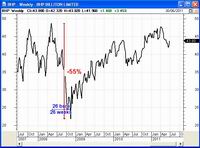
BHP fell 55% in 26 weeks:
See more stocks in this
category.
|
|
True or False?
If our investment horizon is only 3 to 5 years,
we should leave our money in the share
market.
Even though we might end up with less money than
we started with.
Question: Is this
sensible?
|
Is this
sensible?
Some investors firmly believe:
"I am very clear about my
investment goals.
I hold Blue Chip stocks so that I can
earn an income from their dividends.
During times of financial crisis, and
bear market periods, their share price
might fall significantly.
But that is okay because they might
eventually recover, and I earn
dividend income in the meantime."
Question: Is this
sensible?
|
How long can blue chip
stocks
stay below recent highs?
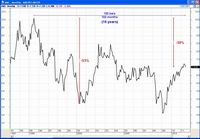
Amcor (AMC) - 16+ years |
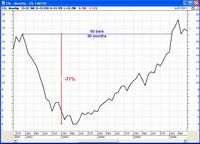
CSL - 4 years |
See more stocks in this
category.
Hint: Take a look at TSR
(Total Shareholder Return).
You might be surprised at how bad the
situation really is.
|
|
Is this
sensible?
Some investors firmly believe:
"I am invested in well-known
companies.
So I can ignore all news about
company performance and share price.
The share price might plummet, or
the company might teeter on the
verge of liquidation.
There might be earth shattering
events that impact the company -
events such as litigation due to a
failed product, or government policy
changes.
But none of this matters. So I will
ignore all the news."
Question: Is this
sensible?
|
Can
well-known
companies really go bust?
Can I really lose all my investment?
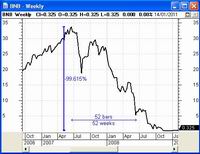
BNB
Babcock and Brown |
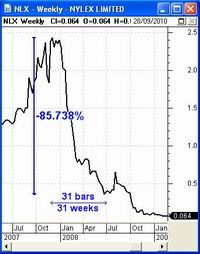
NLX
Nylex Limited |
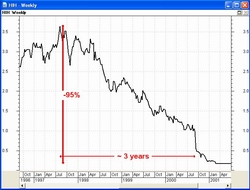
HIH
|
|
|
|
Now consider the following:
Fact#1:
As stated abaove, the
sharemarket really can fall between 20% and 40%
every few years,
and it can take 3 to 5 years (or more) before it
recovers the lost ground.
Not
convinced? See the bear
markets
history.
True or False?
When the market is showing signs of a fall of
this magnitude, it might be wiser to move our
investments away from the share market and into
assets like cash or bonds. Then we can preserve
our capital, take profits, and limit any losses.
Question: Now is this
sensible?
But how can this be
possible? - For clues about just one way to do
this, see the Weinstein approach...
Fact#2:
Blue
chip companies are usually major
companies that are
known for their ability to make profits in good
times or in bad,
and with reduced risk of default.
Even so, some blue
chip stocks were heavily impacted
during the GFC (2008-2010+).
(If you missed the details above, see more about how blue chips
can be disapointing...)
True / False?
Just because a company is a so-called blue
chip does not guarantee that it's share
price performance will be continually rising,
nor that it is insulated from various risks such
as adverse market events, government policy,
climate/weather events, and so on. So, we should
take an interest in the company and its
performance.
Question: Now is this
sensible?
|
So, how can we do this?
How can we invest sensibly?
Fundamental analysis
There is some merit in using Fundamental Analysis when
searching for companies in which to invest. This
will help us to invest only in "quality"
companies that should be able to stay around for
the long term, and which should be able to
produce acceptable returns on an ongoing basis.
BUT! There is a limit to how much we can rely
on fundamental analysis. Many people used
nothing but fundamental analysis during the GFC
period, and look at the results! - some
portfolios were severely impacted. Some of the
more successful investors use between 5 and 50
percent fundamental analysis for their investing
decisions.
Technical analysis (and charting)
Now before you laugh and scoff, this is really
worth reading, and it actually has nothing
to do with tea leaves.
Remember
that the price charts summarise the
underlying opinions and emotions of the market
participants.
Every chart
tells a story, and it pays to understand the
stories in the price charts.
Note that Technical Analysis
is the study of price charts in anticipation of
future price movements. It is very true that
price charts reflect the mood and sentiment of
the share market, and they also reflect all
known news about a company (well, almost all
known news).
Many technical analysts who properly analysed
the market and properly followed proven
strategies actually made profits during the GFC
down turn when others were making losses. So,
there is a great degree of merit in Technical Analysis.
Some of the more successful investors use
between 50 and 95 percent
technical analysis for their
investing decisions . Many use it to time
their entry into a position, and their exit from
a position.
 Funda-Technical
Analysis Funda-Technical
Analysis
It seems most sensible that a combination of
Fundamental Analysis and Technical Analysis
could be very beneficial - let's call it Funda-Technical Analysis.
This approach utilises a clever blend of
fundamental analysis to weed out poor performing
and poorly managed companies, and technical
analysis to time the entry and exit in order to
optimise the capital returns.
Nimble Short Term Investing
Over the years, Robert has carefully thought
about the number of different investing
strategies, and has documented just one
approach, and named it the Nimble
Short Term Investing approach. Read more about this...
Be aware of the state of the market
Robert has already written some material about
the Key Lessons from the Global Financial Crisis
for the future benefit of investors and traders.
It also carries the title "Beware the Share
Market Bears". You can see that
material here. And more information about
this topic and "Anti-decimation -
Avoiding the next GFC" in the Slide Presentations that
Robert has presented to several public groups.
More information?
See more information about some of these key
topics:
|
How about something just a
touch radical?
More information about the
latest redefinition for
Contrarian Investing...
|
|
|